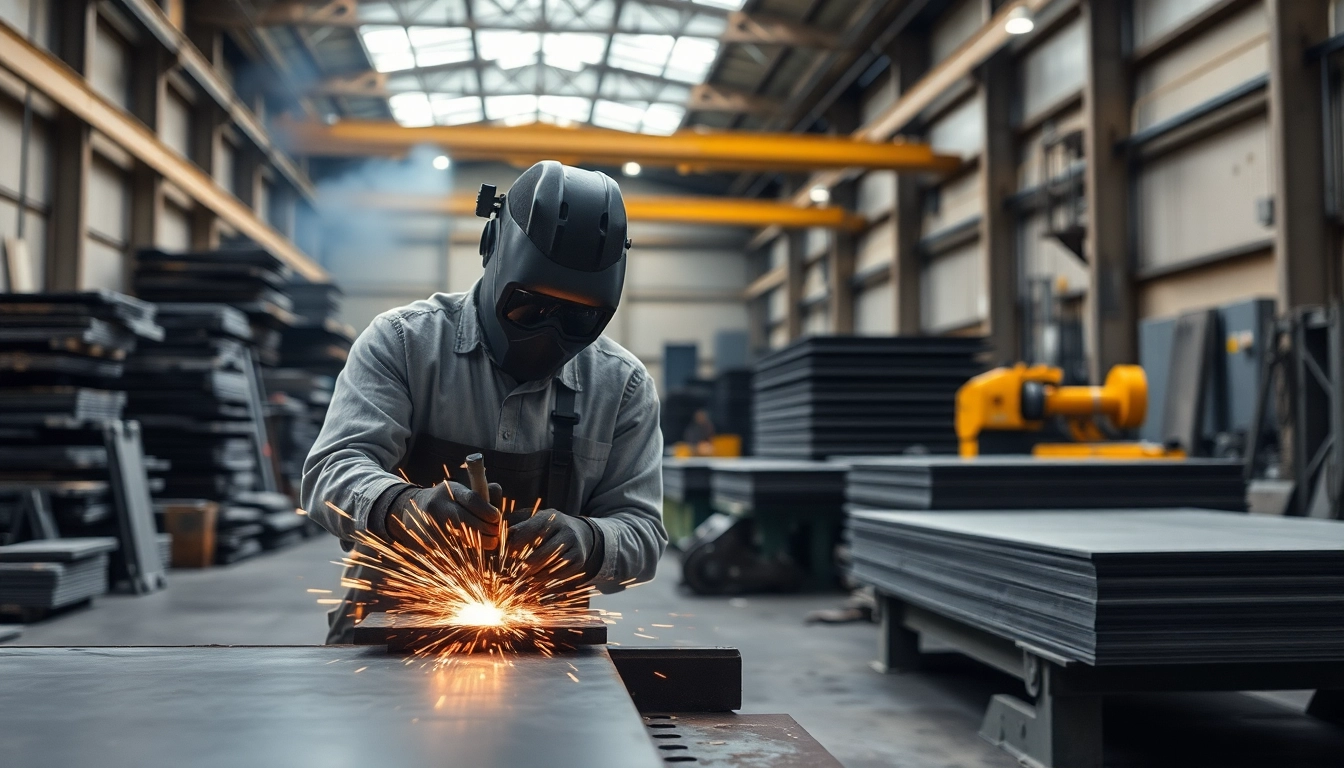Understanding Steel Fabrication Basics
What is a Steel Fabrication Shop?
A steel fabrication shop is a specialized facility that engages in the processes of cutting, shaping, and assembling steel structures and components. Functioning as the backbone of various industries, these shops provide critical services that contribute to construction projects, manufacturing, and even art installations. The processes employed in a steel fabrication shop transform raw steel into finished products that adhere to strict industry standards. This transformation requires skilled labor, precise machinery, and a dedication to quality assurance, making it an essential player in the industrial landscape. If you’re seeking a reliable steel fabrication shop, understanding the intricacies of this domain can significantly enhance your project’s success.
Core Services and Processes
The core services offered by a steel fabrication shop typically involve several key processes: machining, cutting, welding and assembly. Each of these services plays a critical role in transforming raw steel into usable parts.
- Machining: Involves the removal of material from a steel workpiece to achieve desired dimensions and surface finishes. Techniques include milling, turning, and drilling.
- Cutting: This is often the first step in the fabrication process, where large sheets and beams are cut to specified sizes. Methods include plasma cutting, laser cutting, and waterjet cutting.
- Welding: A crucial process that joins steel pieces together, ensuring structural integrity. Various welding techniques like MIG, TIG, and stick are employed depending on the project requirements.
- Assembly: Once individual components are fabricated, they are assembled into more complex structures, ready for delivery or further site work.
The Importance of Quality Materials
The quality of materials used in steel fabrication cannot be overstated. Using high-grade steel not only enhances the strength and durability of the final products but also influences the efficiency of the fabrication processes. Low-quality materials can lead to increased waste, more frequent repairs, and safety issues, all of which can have significant cost implications. It’s essential for steel fabrication shops to establish reliable sourcing methods for their raw materials, ensuring they meet relevant industrial standards and specifications. Quality control measures, including comprehensive testing and certification of supplied materials, are crucial in this regard.
Key Equipment in Steel Fabrication Shops
Essential Machinery for Fabrication
A steel fabrication shop is outfitted with essential machinery designed to facilitate various fabrication processes. The most common equipment includes:
- Shears: Used for cutting sheet metal into desired shapes.
- Press Brakes: Employed for bending and shaping metal sheets, allowing for a range of angles and folds.
- Welding Machines: Integral tools that fuse metal pieces together through different welding techniques.
- CNC Machines: Computer Numerical Control machines automate machining processes to enhance precision and reduce human error.
Investing in high-quality equipment maximizes productivity and ensures safer working conditions for employees.
Maintaining Your Tools and Equipment
Regular maintenance of tools and equipment is vital in any steel fabrication shop. A scheduled maintenance plan can prevent unexpected breakdowns and prolong the life of the machinery. Key maintenance practices include:
- Conducting routine inspections to identify wear and tear.
- Calibrating equipment regularly to ensure precise measurements.
- Updating software for CNC machines to keep them running efficiently.
- Cleaning and lubricating machines to prevent corrosion and mechanical issues.
By proactively maintaining equipment, shops can mitigate costly repairs and minimize downtime.
Technological Innovations in Fabrication
The steel fabrication industry is experiencing rapid technological advancements that are revolutionizing traditional methods. Innovations such as 3D printing, robotics, and automation not only improve efficiency but also enhance the precision of fabrication processes. Each of these technologies breaks new ground in the way steel is fabricated:
- 3D Printing: Offers the capability to create intricate parts with reduced material waste, providing rapid prototyping options.
- Robotics: Automated robotic welders and cutters increase production speed and accuracy while reducing human labor costs.
- Software Solutions: Advanced software for design, testing, and project management enhances workflow and minimizes errors.
Staying updated with technological trends ensures fabrication shops remain competitive in an ever-evolving marketplace.
Building a Safe Work Environment
Implementing Safety Standards in Steel Fabrication
Safety in a steel fabrication shop is paramount, given the inherent risks associated with heavy machinery and hazardous materials. Implementing robust safety standards can significantly reduce workplace accidents and injuries. Key safety practices include:
- Conducting regular safety audits to identify potential hazards.
- Installing proper signage to alert employees and visitors to potential dangers.
- Providing adequate personal protective equipment (PPE) such as helmets, gloves, and ear protection.
- Establishing clear protocols for equipment usage and emergency procedures.
A proactive approach to safety not only protects employees but also fosters a culture of awareness and responsibility within the workplace.
Training and Development for Employees
Continuous training and development are crucial for upholding safety standards and enhancing operational efficiency in a steel fabrication shop. Employee training programs should cover a wide range of topics, including:
- Safe operation of machinery.
- Emergency response procedures.
- Material handling and storage techniques.
- Quality control standards and inspection processes.
Offering ongoing training opportunities not only improves skills but also encourages employee engagement and retention.
Emergency Protocols and Equipment
Every steel fabrication shop must establish comprehensive emergency protocols to respond swiftly to accidents or unexpected events. Essential components of emergency preparedness include:
- Clear communication channels for reporting incidents.
- Regular drills to familiarize staff with emergency procedures.
- Accessibility to first aid kits and firefighting equipment.
- Designated assembly points for employees in case of evacuation.
Having a detailed plan and the necessary equipment can make a significant difference in effectively managing emergencies when they arise.
Streamlining Operations for Enhanced Productivity
Effective Workflow Management Techniques
Streamlining operations in a steel fabrication shop is essential for boosting productivity and improving quality. Effective workflow management involves:
- Mapping out the production process to identify bottlenecks.
- Implementing standard operating procedures (SOPs) to ensure consistency.
- Employing task management software for planning and resource allocation.
- Encouraging feedback from employees to pinpoint areas of improvement.
By consistently refining workflows, fabrication shops can enhance their operational efficiency and delivery timelines.
Inventory Control in Steel Fabrication Shops
Effective inventory control is crucial in managing costs and ensuring the availability of materials in a steel fabrication shop. Practices that contribute to better inventory management include:
- Implementing an inventory management system for real-time tracking of materials.
- Establishing reorder points to prevent stockouts.
- Conducting regular audits of inventory to maintain accuracy.
- Utilizing bulk purchasing strategies for high-demand materials.
Streamlined inventory processes reduce excess stock and minimize waste, leading to healthier profit margins.
Using Lean Manufacturing Principles
Lean manufacturing principles focus on reducing waste while enhancing productivity in operations. In a steel fabrication shop, applying these principles can lead to significant improvements. Practices include:
- Identifying non-value-added activities and eliminating them.
- Utilizing just-in-time (JIT) production to align manufacturing with demand.
- Involving employees in continuous improvement initiatives.
- Implementing 5S techniques (Sort, Set in order, Shine, Standardize, Sustain) to improve workplace organization.
Adopting lean methods helps in streamlining operations, reducing costs, and improving overall product quality.
Measuring Success and Growth in Steel Fabrication
Key Performance Indicators for Fabrication Shops
Measuring success in a steel fabrication shop involves tracking key performance indicators (KPIs) that provide insights into operational efficiency and profitability. Essential KPIs include:
- Overall Equipment Effectiveness (OEE): A measure of how effectively a fabrication shop utilizes its machinery.
- Production Yield: The ratio of acceptable products to total produced items.
- Order Turnaround Time: The time taken from receiving an order to its completion.
- Customer Return Rate: Percentage of customers who return products due to defects or dissatisfaction.
Regular analysis of these KPIs supports informed decision-making and drives continuous improvement.
Customer Satisfaction and Feedback Metrics
Measuring customer satisfaction is critical for the growth of a steel fabrication shop. Engaging with customers post-project can reveal valuable insights. Metrics to consider include:
- Customer surveys focusing on service, quality, and delivery.
- Net Promoter Score (NPS) to gauge likelihood of client recommendations.
- Feedback on change orders or project modifications to assess adaptability.
- Tracking repeat business as a measure of customer loyalty.
Implementing structures for collecting and analyzing customer feedback enables fabricators to enhance service offerings and client relations.
Scaling Your Steel Fabrication Business
For a steel fabrication shop to grow successfully, planning and strategic scaling are necessary. Key strategies for scaling include:
- Expanding service offerings to tap into new markets or industries.
- Investing in advanced technology to boost production capacity.
- Building partnerships with suppliers and contractors for streamlined operations.
- Implementing a robust marketing strategy to attract new clients.
By aligning growth strategies with market needs, steel fabrication shops can position themselves for sustainable long-term success.








